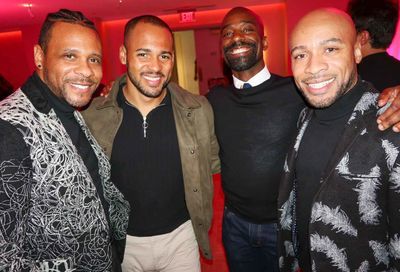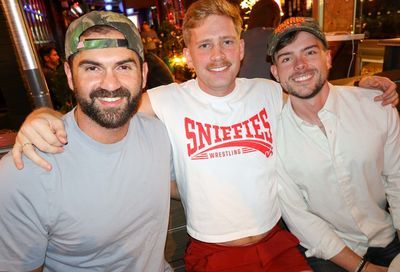Doggie Style
Commentary: In Exile
From the start, the dog was unruffled, collected and mature. She quietly waited for her two new owners to stop yelping and jumping on the furniture. She knew, given time, we’d wear ourselves out and lie down.
We’d just arrived home from the ASPCA, and outside our apartment, the first few pillowy flakes of what would turn out to be the biggest blizzard in the city’s history were beginning to fall. We’d rolled up the white shag rug that Carl’s parents had given us, in case the dog felt compelled to christen her new home. We bounded around her, offering toys and treats, like Aztecs trying to appease an ambivalent god. ”Hey puppy! Wanna treat? Huh? Huh? Wanna treat?” The dog raised an eyebrow.
The woman at the shelter had said our new pet probably wouldn’t eat much at first, so nervous would she be about her new environs. But this dog promptly scarfed down a bowl of kibble and fell asleep on our couch. At a loss, we thought about making dinner, but found we were too keyed up to eat anything. It had been a long day of meets-and-greets with a variety of dogs composed of a great range of demeanors.
One of the dogs suffered from separation anxiety and couldn’t be left alone. Another — a large, long-haired shepherd — harbored what the behaviorist neutrally described as ”a very strong prey instinct.” The vast majority of the shelter’s residents are pit bulls. New York’s pound takes in 6,000 pit bulls a year. The pit is exactly the kind of dog New Yorkers want to be seen with: tough, strong, strangely elegant. Goes as well with leather and spikes as it does with chinchilla and Prada. Though most pits are well-behaved, there are the occasional horror stories, and we succumbed to profiling and ruled out the pit bulls.
Eventually, we met a shepherd-mix named Kiara that could be considered scary only in her cool composure. Two years old, she’d been seized by the police from her previous owner (they don’t tell you why). Her fur was onionskin yellow, her snout a dark, Fred Flintstone five o’clock shadow. When we walked into the room, she came over, sniffed our crotches, turned around and returned to her cot to lie down. Suckers for those who dismiss us, we immediately fell in love.
Downstairs, a large woman with a white crew cut that ended in a rattail helped us with the paperwork. Sitting across from her, I perused the shelter’s pamphlets about dog care while Carl read the New York Times. ”Well, I can see who’s the mommy and who’s the daddy here,” the woman dryly observed, and then went on to talk about leash etiquette, heartworm pills and the importance of a consistent diet. She informed us that there was a small chance we’d receive a call from the producers of Animal Precinct asking if we’d like to be on the show, and assured us that it was totally our decision. She absorbed our blank stares for a few seconds before pushing her glasses to the tip of her nose and intoning gravely, ”You mean you don’t watch Animal Planet?” Carl and I exchanged a quick glance. We’d already filled out the forms. Could they refuse to adopt us a dog for this offense? Should we lie?
In the end, we were told that we’d adopted ”a marvelous dog,” and sent on our way. We swung by a pet store for food and supplies, then hailed a cab to take us the 84 blocks back to the East Village. That night, thinking the name Kiara hideous, we renamed her Kira — similar enough to Kiara so that she wouldn’t know the difference, but different enough to make her ours. She slept in the bed with us, and the next morning, a Sunday, we awoke to find the city at a standstill, muted by huge drifts of snow. We took Kira to the dog run where she quickly made friends. We unrolled the white shag, confident now that she wouldn’t crap on it.
It’s been almost four weeks, and Kira’s initial dismissiveness has turned to devotion that borders on neediness. Our sleep cycle, formerly on a journalist’s sleep-late, work-late schedule, has given way to pre-dawn walks on streets populated mainly by other dog walkers and delivery trucks. I go home to walk her on my lunch hour, eating my sandwich on the subway. I stay in more often on weeknights to watch TV with the dog.
Our apartment will never be truly clean again. Our blue couch now more closely matches the color of the dog. On the flip side, for some reason, our mouse problem is over — since Kira showed up, they haven’t. And my relationship with Carl has changed subtly, too. The shared responsibility has cultivated a new sense of correspondence. Rather than just text messaging each other inside-jokes all day, we now send things like, ”cant b home til 10. u walk her?” Something about the necessity of checking in has made our relationship more of a partnership. There’s a sense of attention to logistics that wasn’t there before. The inconvenience of a dog has brought us oddly closer.
But for the most part, Kira takes care of herself. Right now, she’s dozing on the couch at my feet, occasionally standing up to stretch and glance over at me as if to say, ”I was lucky to get such a well-behaved owner. You’re so easy to take care of.”
Will Doig writes from his exile in New York City. He can be reached at wdoig@metroweekly.com.
Support Metro Weekly’s Journalism
These are challenging times for news organizations. And yet it’s crucial we stay active and provide vital resources and information to both our local readers and the world. So won’t you please take a moment and consider supporting Metro Weekly with a membership? For as little as $5 a month, you can help ensure Metro Weekly magazine and MetroWeekly.com remain free, viable resources as we provide the best, most diverse, culturally-resonant LGBTQ coverage in both the D.C. region and around the world. Memberships come with exclusive perks and discounts, your own personal digital delivery of each week’s magazine (and an archive), access to our Member's Lounge when it launches this fall, and exclusive members-only items like Metro Weekly Membership Mugs and Tote Bags! Check out all our membership levels here and please join us today!




















